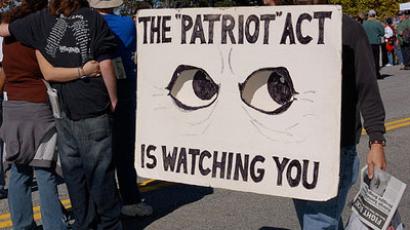Congress wants to spy on everyone's Internet

Goodbye, civil liberties! The government is using a bill disguised as anti-child pornography legislation to allow them to start monitoring Web-usage of everyone.
The Protecting Children from Internet Pornographers Act of 2011 (H.R. 1981) is aiming to keep the Web safe for children, but in the process it will treat any user logging on to the Internet as a potential criminal. Bill sponsor Lamar Smith, House judiciary committee chairman and Representative from Texas, says that pedophiles have been able to avoid prosecution in the past because vital records linking them to web usage were never required to be retained. Under H.R. 1981, Internet Service Providers would have to hold onto those records for 12 months.Those records, however, won’t apply to just suspected child pornographers and pedophiles. Instead, ISPs will be doing data retention on all of their customers.If passed, the bill will keep the names, addresses, phone numbers, credit card numbers, bank account numbers and temporarily-assigned IP addresses of everyone on the Internet on file for a full year.Smith says that the law is similar to what telephone companies are currently required to do by keeping phone records of their customers. Rep. Darrell Issa (R-Calif.), however, says it’s just an attempt to pry even deeper into the public lives of citizens.“This is not about child porn. It never has been and never will be,” Issa said. “This is a convenient way for law enforcement to get what they couldn’t get in the PATRIOT Act.” Issa further added that he is “offended” that lawmakers would use the issue of child pornography to gain leverage in passing the law.Fellow California Democratic Representative Zoe Lofgren shared the same sentiments as Issa. “This is among the most astounding increases in the power of the federal government to gain access to private information,” she said.“The bill is mislabeled,” Rep. John Conyers (D-MI) tells CNET. "This is not protecting children from Internet pornography. It's creating a database for everybody in this country for a lot of other purposes."Rep. Bobby Scott (D-Va.) proposed an amendment to H.R. 1981 which would limit the data retention to only cases involving child pornography or terrorism. Despite that being why backers claim the bill exists, it ended up being withdrawn. When he tried another amendment to reduce the time that data is retained from one year to 180 days, it failed to win on the voting floor.Rep. Smith responded that doing so could undermine current cases regarding other issues.In a statement issued by the Center for Democracy & Technology out of Washington DC, the non-profit advocacy group says that the passing of H.R. 1981 would “fundamentally violate users’ rights to privacy and free expression.” The CDT adds that telephone companies that offer Internet service to customers will be faced with an enormous burden of handling the request of data retention, which will be a costly mandate to wireless carriers.“In other words, the data retention provisions in H.R. 1981 would threaten our civil liberties, create significant economic burdens for small businesses and wireless carriers, and put consumers at a greater risk for identity theft and other privacy invasions,” writes the DCT.In addition to receiving backing from Rep. Smith, H.R. 1981 is also receiving praise from Congresswoman Debbie Wasserman Schultz (D-FL), the National Center for Missing and Exploited Children, the National Center for Victims of Crime, the National Sheriff’s Association, the Major County Sheriff’s Association, the International Union of Police Associations and the Fraternal Order of Police.














